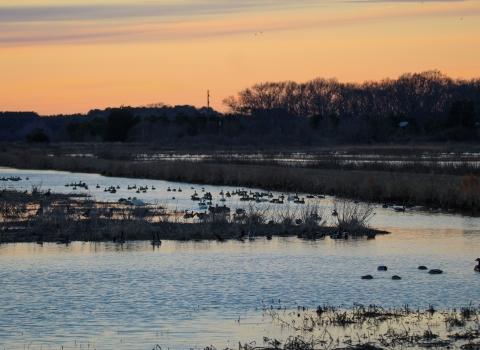The U.S. Fish and Wildlife Service (Service) today announced the start of a public process and the opening of a 60-day comment period seeking input on managing non-federal oil and gas development on National Wildlife Refuge System (NWRS) lands.
This effort is part of the Service’s ongoing commitment to avoid or minimize adverse effects on natural and cultural resources and wildlife-dependent recreation, ensure a consistent and effective regulatory environment for oil and gas operators, and protect public health and safety.
“Throughout the process, the Service will work with the public, the oil and gas industry and conservation groups to ensure we are using the best management practices and other industry standards for the conservation of fish, wildlife, plants and their habitats,” said Director Dan Ashe. “Working in collaboration with these stakeholders will improve the agency’s ability to ensure landscapes capable of supporting sustainable populations of fish and wildlife while providing for the energy needs of local communities – now and in the future.”
On many Service lands, including wildlife refuges, the federal government does not own the rights to subsurface minerals. Instead, mineral rights are owned by private individuals or other entities, which have the legal authority to develop their oil and gas resources.
Additionally, some refuges had existing oil and gas wells and associated infrastructure and pipelines when they were acquired by the Service, which has allowed operations of oil and gas facilities to continue. Based on the Service’s best available data, more than 200 refuges have oil and gas operations, including more than 5,000 wells, almost 1,600 actively producing oil and gas wells, and almost 1,300 miles of pipelines.
In 2003 and 2007, the Government Accountability Office (GAO) issued reports to Congress recommending that the Service clarify permitting authority for non-federal oil and gas operations by adopting regulations similar to the National Park Service and the U.S. Forest Service. These regulations would provide a consistent and reasonable set of regulatory controls over the oil and gas activities occurring on refuges to protect the public’s surface interests and provide reliable processes for industry.
Due to recent technological advances in drilling technology, the NWRS is experiencing an unprecedented level of interest in accessing formations such as the Marcellus in the eastern U.S. and the Bakken in North Dakota and Montana, both previously uneconomic to develop. Refuges that lie above these formations are being impacted at rates much higher than in the past. Existing oil and gas regulations do not fully address these challenges.
Written comments and information can be submitted by one of the following methods:
- Federal eRulemaking Portal: http://www.regulations.gov. Follow the instructions for submitting comments to Docket No. [FWS–HQ–NWRS–2012–0086]; or
- U.S. mail or hand-delivery: Public Comments Processing, Attn: [FWS–HQ–NWRS–2012–0086]; Division of Policy and Directives Management; U.S. Fish and Wildlife Service; 4401 N. Fairfax Drive, MS 2042–PDM; Arlington, VA 22203.
Since this is a formal rulemaking process with subsequent National Environmental Policy Act support, the Service anticipates this effort will take at least three years to complete.
The notice will publish in the Federal Register on February 24, 2014. Comments must be received within 60 days, on or before April 25, 2014. The Service will post all comments on http://www.regulations.gov. This generally means the agency will post any personal information provided through the process. The Service is not able to accept email or faxes.
Comments and materials, as well as supporting documentation, will be available for public inspection at http://www.regulations.gov under the above docket number. In addition, more details on the kinds of information the Service is seeking is available in the notice and will be posted online at http://www.fws.gov/refuges/oil-and-gas/.
The National Wildlife Refuge System protects wildlife and wildlife habitat on more than 150 million acres of land and water from the Caribbean to the Pacific, Maine to Alaska. Refuges also improve human health, provide outdoor recreation and support local economies. Visit our home page at www.fws.gov/refuges. Follow us on Facebook and Twitter.


